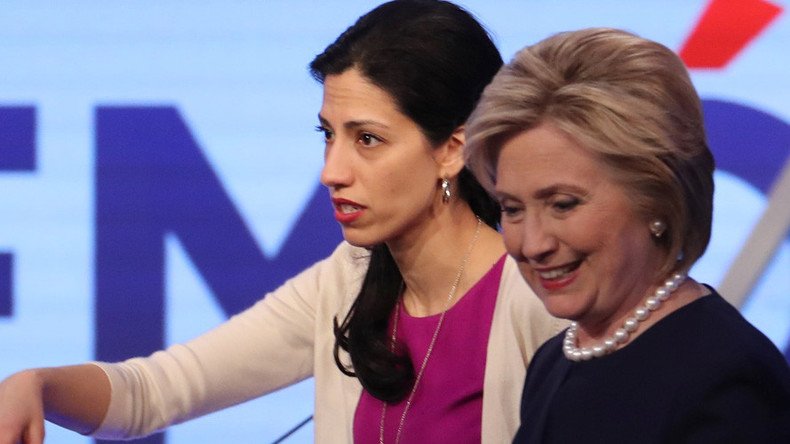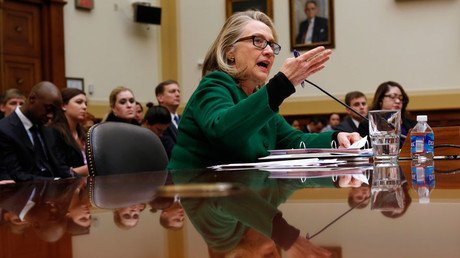‘Classified info, influence peddling, cover-ups’: More Clinton emails brought to light

The latest emails obtained from the private account of Hillary Clinton aide Huma Abedin contain four documents with classification marks and further proof of improper ties with the Clinton Foundation, says the group that received them.
On Wednesday, Judicial Watch released 1,600-plus pages of emails that the State Department had to turn over under the group’s Freedom of Information Act (FOIA) lawsuit. The documents include 91 email exchanges that were not previously turned over to the State Department, for a total of 530 emails that were not included in Clinton’s initial 55,000-page disclosure.
“Pay to play, classified information mishandling, influence peddling, cover-ups – these new emails show why the criminal investigation into Hillary Clinton’s conduct must be resumed,” said Judicial Watch president Tom Fitton.
New Abedin/Clinton emails show why the criminal investigation into Hillary Clinton’s conduct must be resumed. https://t.co/1pHlrE6WKf
— Tom Fitton (@TomFitton) August 2, 2017
Four emails contained materials classified as “confidential,” whose contents were redacted by the State Department under the FOIA exemption B1.4(D) as “dealing with foreign relations or foreign activities.”
This includes a March 12, 2009 memo from Clinton confidant Sidney Blumenthal about Northern Ireland; a February 27, 2009 memo from Ambassador Melanne Verveer about Congo; a January 22, 2010 email from Deputy Chief of Staff Jake Sullivan to to several State Department officials about a call with the foreign minister of China; and an August 20, 2010 memo about Clinton’s call with Spanish Foreign Minister Miguel Moratinos, sent to Abedin by State Department official Laura Lucas.
On four occasions in 2010, Clinton aide Lona Valmoro forwarded the secretary of state’s daily schedule to Clinton Foundation executives, the documents show.
A number of emails also show Clinton staff being frustrated by secure communications lines and sending files and documents via unsecured channels. Several emails from February 2010 show Abedin discussing the secure fax with Justin Cooper, the man who helped administer Clinton’s private email server, but was not a State Department employee and did not possess security clearance.
Two more exchanges show Clinton and her associates worried about appearances.
On February 26, 2010, Clinton complained to Abedin about the absence of two staffers, adding that the purpose of the photo shoot scheduled for that day was “to show a team that is diverse in every way. That won’t happen and I am worried about that.”
On April 18, 2009, Abedin told senior adviser Philippe Reines about “an encounter” Clinton had with Venezuelan President Hugo Chavez.
“Was the encounter on camera or widely seen?” Reines asked, to which Abedin replied: “Seen by a dozen people. A photog came in and took a photo at the end.”
Judicial Watch also sought documents from the Department of Justice related to the meeting then-Attorney General Loretta Lynch had with former President Bill Clinton at Phoenix Sky Harbor International Airport in June 2016.
However, the DOJ has refused to release the talking points Lynch sent to Public Affairs in response to press requests, claiming an exemption to protect internal deliberations.
“The Trump Justice Department and FBI need to reassure the American people they have finally stopped providing political protection to Hillary Clinton,” Fitton said, commenting on the rejection.













